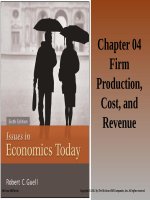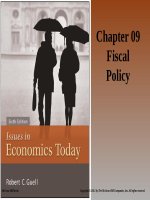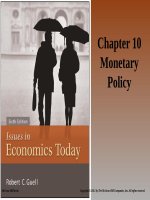Isues in economics today 6th by guell chapter38
Bạn đang xem bản rút gọn của tài liệu. Xem và tải ngay bản đầy đủ của tài liệu tại đây (477.51 KB, 20 trang )
Chapter 38
Energy
Prices
McGraw-Hill/Irwin
Copyright © 2012 by The McGraw-Hill Companies, Inc. All rights reserved.
Chapter Outline
• Historical View
• OPEC
• Why Prices Change So Fast?
• What Will The Future Hold?
• Kick It Up A Notch
McGraw-Hill/Irwin
©2012 The McGraw-Hill Companies, All Rights Reserved
38-2
1-2
Real Oil and Gas Prices
2005 dollars Per gallon (1 barrel=42 gallons)
McGraw-Hill/Irwin
©2012 The McGraw-Hill Companies, All Rights Reserved
38-3
1-3
Historical Events
Relating to Oil and Gas Prices
• 1972 Arab-Israeli War
• US support for Israel prompted an embargo by Arab oil
producers against the US and Europe. This led to a
significant increase in crude oil prices.
• 1979 Iranian Revolution
• Iran’s Islamic revolution led to instability in the Persian
Gulf. This led to a significant increase in crude oil prices.
• 1980’s
• Rapid increases in profits led to significant discoveries
of oil in Mexico and the North Sea
• 1980-1988 Iran-Iraq War
• The war led to increased production by both parties as
each needed to fund their war effort. This caused a
precipitous fall in crude oil prices.
McGraw-Hill/Irwin
©2012 The McGraw-Hill Companies, All Rights Reserved
38-4
1-4
World Oil Reserves
Group
Billions of Barrels in
Reserve
Percentage of
World
Reserves
Persian Gulf
747
60%
Non-Persian
Gulf OPEC
181
15%
Rest of the
World
310
25%
McGraw-Hill/Irwin
©2012 The McGraw-Hill Companies, All Rights Reserved
38-5
1-5
OPEC
• The Organization of Petroleum
Exporting Countries (OPEC)
• Algeria, Indonesia, Iran, Iraq, Kuwait, Libya,
Nigeria, Qatar, Saudi Arabia, United Arab
Emirates, and Venezuela
• OPEC began as a cartel.
• A cartel is an organization of
individual competitors that join
to form as a single monopolist.
McGraw-Hill/Irwin
©2012 The McGraw-Hill Companies, All Rights Reserved
38-6
1-6
Was OPEC a Cartel?
OPEC production has always been a significant part of the oil
market but it has never reached the level of monopoly. The cartel
model is still useful because it has been a dominant player.
McGraw-Hill/Irwin
©2012 The McGraw-Hill Companies, All Rights Reserved
38-7
1-7
The Cartel Model
Market for Oil
P
P
S=MC
One Country’s Oil
MC
Profit
Profit
ATC
MR’
Pcartel
PPC
MR
D
Qcartel
MR
McGraw-Hill/Irwin
QPC
Q
Qquota
QPC Qcheat Q
©2012 The McGraw-Hill Companies, All Rights Reserved
38-8
1-8
Why Oil and Gas Prices Change
So Fast
• Because expected price is a determinant of
supply and demand a world event that
causes people to expect a price increase
will
• Increase current demand (as middlemen and
consumers try to buy as much as possible)
• Decrease current supply (as middlemen and gas
stations try to hold onto their current stocks)
• This causes an immediate increase in
prices.
McGraw-Hill/Irwin
©2012 The McGraw-Hill Companies, All Rights Reserved
38-9
1-9
Historical Events
Relating to Oil and Gas Prices
• 1990
• 1992-1998
• 1999
• 2003
• 2004-2005
• 2007
• 2008
McGraw-Hill/Irwin
Iraq Invasion of Kuwait
OPEC massive
overproduction
OPEC discipline
US invasion of Iraq
Hurricanes in the Gulf of
Mexico
Iran-US tensions; Commodity
Speculation
Global Financial Crisis
©2012 The McGraw-Hill Companies, All Rights Reserved
38-10
1-10
From $1 to $4 in Ten Years
1)
2)
3)
4)
5)
6)
7)
OPEC production cuts; Low stocks of oil; bad weather
Release of oil from the Strategic Petroleum Reserve; recession
Political unrest in oil producing Venezuela and Nigeria; War in Iraq
Hurricanes Damage Platforms in the Gulf of Mexico
Threatened Conflict b/w U.S. Iran
Global Commodity Speculation
Global Financial Crisis
McGraw-Hill/Irwin
©2012 The McGraw-Hill Companies, All Rights Reserved
38-11
1-11
Gasoline Prices 1998-2008
McGraw-Hill/Irwin
©2012 The McGraw-Hill Companies, All Rights Reserved
38-12
1-12
Gasoline Prices and Hurricanes
A significant portion of refining capacity in the US is in the Gulf of Mexico
McGraw-Hill/Irwin
©2012 The McGraw-Hill Companies, All Rights Reserved
38-13
1-13
Electricity
• Residential electric power tends to
be sold by a regulated monopoly.
• It has been a monopoly because of
significant barriers to entry.
• It has been regulated because prices
would be much higher than is
socially optimal.
McGraw-Hill/Irwin
©2012 The McGraw-Hill Companies, All Rights Reserved
38-14
1-14
Types of Monopolies
• Simple Monopoly: a monopoly in
which marginal costs of production
are rising.
• Natural Monopoly: a monopoly in
which marginal costs of production
are falling.
McGraw-Hill/Irwin
©2012 The McGraw-Hill Companies, All Rights Reserved
38-15
1-15
Monopoly in the Market for
Residential Electricity
• The market for residential electricity is
likely to be a natural monopoly for
nuclear power because of the very
high fixed costs (transmission lines
and the power plant and diminishing
marginal costs.)
• The market may be characterized as a
simple monopoly or natural monopoly
for coal or gas generated electricity.
McGraw-Hill/Irwin
©2012 The McGraw-Hill Companies, All Rights Reserved
38-16
1-16
An Unregulated Simple Monopoly
MCMonopoly
P
Pmonopoly
MR
Qmonopoly
McGraw-Hill/Irwin
D
Q
©2012 The McGraw-Hill Companies, All Rights Reserved
38-17
1-17
An Unregulated Natural Monopoly
P
Pmonopoly
D
MR
Qmonopoly
McGraw-Hill/Irwin
ATC
MCMonopoly
Q
©2012 The McGraw-Hill Companies, All Rights Reserved
38-18
1-18
An Regulated Simple Monopoly
MCMonopoly
P
Pmonopoly
Pregulated
D
MR
Qmonopoly Qregulated
McGraw-Hill/Irwin
Q
©2012 The McGraw-Hill Companies, All Rights Reserved
38-19
1-19
An Regulated Natural Monopoly
P
Pmonopoly
D
Pregulated
MR
Qmonopoly
McGraw-Hill/Irwin
Qregulated
ATC
MCMonopoly
Q
©2012 The McGraw-Hill Companies, All Rights Reserved
38-20
1-20









